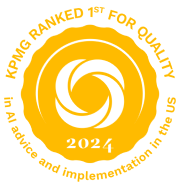AI value depends on AI security
A guide for CISOs to assess and manage risks in AI ecosystems

Getting CISOs up to speed on AI security
Artificial intelligence (AI) is redefining the business world. By designing, building and deploying AI solutions at scale, organizations can help support better decision making, identify new opportunities for growth, help reduce operational costs and improve customer experiences.
But as businesses integrate AI at scale, existing risks are amplified and new risks are clearly present—and Chief Information Security Officers (CISOs) and their security teams face a multifaceted challenge:
- Quickly assessing the range of risks AI technology poses across the enterprise
- Embedding the right framework to help all business stakeholders effectively manage AI risks and secure the enterprise
- Helping ensure AI solutions are compliant with rapidly evolving standards and regulations
Critical AI-related security risks
AI is changing the threat landscape for today’s organizations. Unlike traditional software where algorithms follow a set learning path, AI applications involve an iterative process based on autonomous learning and a stream of data to support large language models (LLMs). This process is a key part of the power of AI, enabling AI applications to learn and change, automate complex processes, and leverage huge amounts of data. But it can also introduce critical risks, such as:

- Data poisoning and bias
- Breaches of sensitive data
- Prompt injection
- Model theft and replication
- Model evasion
- Backdoor attacks
- Phishing
- Trojan attacks
- Regulatory penalties
Developing a comprehensive AI security framework
AI requires new ways of thinking about security and privacy. In traditional IT environments, security management involved switching out hardware components and releasing new software versions or patches on a regular basis to address new threats. Today’s AI systems are far more dynamic, interactive, and customized, with more risks and the need to address these risks in real time. Accordingly, AI security must be built into AI systems from the ground up, embrace the entire AI environment, and be continuously monitored for safety, security, and proper governance. A comprehensive AI security framework includes:
- The development of an enterprise-wide framework for assessing and securing AI systems, backed by policy and procedure documents in line with security and regulatory requirements
- A survey of existing AI platforms, data sources, tools, and architectures
- The identification of where AI is currently being used in the organization and by whom
- A review of existing AI policies and procedures
- A mission statement in alignment with organizational values that outlines the goals and commitments of AI security initiatives
- The identification of resource and capacity requirements, goals and metrics, reporting structures, and response plans
- Evaluation of future regulations and security issues.
Benefits of enhanced AI risk management
With a well-designed AI security framework in place, organizations can better seize the value of AI in a quick, confident and responsible manner. Potential security and business benefits include:

- Improved collaboration between data science and cyber teams
- Enhanced cyber-attack monitoring, detection and response
- Increased visibility and control over the AI data lifecycle
- Expanded transparency into third-party vendors’ AI use
- Greater integration of regulatory requirements
- Acceleration of AI value
Dive into our thinking
Learn how to turn AI security into AI value
As organizations look to move from strategy and planning to the operationalization of secure AI ecosystems, our new report shares insights to help CISOs better assess and manage security risks due to enterprise-wide AI technology.
Read the report
KPMG ranks #1 for quality AI advice and implementation in the US
According to senior buyers of consulting services who participated in the Source study, Perceptions of Consulting in the US in 2024, KPMG ranked No. 1 for quality in AI advice and implementation services.
How KPMG AI Security and AI Trust Services
Our AI security professionals tailor the approach to meet the requirements, platforms, and capabilities of different organizations to deliver an effective and accepted security strategy. Consideration of current and upcoming regulations and frameworks underpins all of our solutions.
About KPMG AI Security Services
KPMG AI Security Services is a core Trusted AI capability that helps organizations secure their most critical AI systems with a technology-enabled, risk-based approach. Powered by a proprietary solution created in the KPMG Studio under the auspices of our AI security spinoff Cranium, we help organizations develop and deliver effective security for AI systems and models.
Our AI security framework design provides security teams with a playbook to:
- Proactively assess AI systems in development and production environments
- Secure AI systems against threats such as backdoor attacks and model inversion
- Respond effectively in the event of an attack.
About KPMG AI Trust Services
Trusted AI is our strategic framework and suite of services and solutions to help organizations embed trust in every step of the AI lifecycle. We combine deep industry experience and modern technical skills to help businesses harness the power of AI in a trusted manner—from strategy to design through to implementation and ongoing operations.
Explore more
Popular category topics
Meet the team
Connect with our experienced security professionals to learn how our integrated capabilities can help your business manage AI risks and seize AI opportunities.








